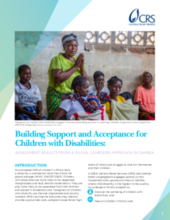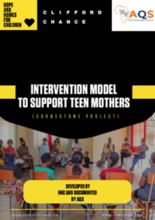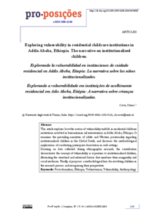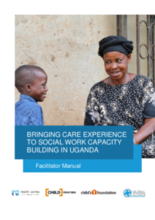Displaying 61 - 70 of 1617
This report highlights the Inclusive Family Strengthening (IFS) project by Catholic Relief Services (CRS) and Catholic Sister congregations. This project aimed to improve the wellbeing of children with disabilities and keep them in family care.
The Teenage Mother project is an intervention model to support teen mothers, developed by Hope and Homes for Children (HHC) in Rwanda. The documents provides an in-depth analysis of the challenges faced by teen mothers, the prioritization of causal factors, and the implementation of the Active Family Support (AFS) model to address these challenges.
An army of trained foster parents are transforming the lives of children who have suffered terrible hardships after being abandoned in institutions
This article examines how vulnerability is constructed and experienced within residential childcare institutions involved in humanitarian interventions in Addis Ababa, Ethiopia, with particular attention to adult narratives and Western positionality. Drawing on ethnographic research, it deconstructs structural and relational factors shaping children’s marginalisation and proposes methodological approaches that centre children’s perspectives in research.
In this webinar, the Africa Working Group on Children Without Parental Care now called Family First for Children Without Parental Care, (FAFICA), explores key global debates and initiatives advancing care reform, including updates from the African Union and global events like the Global Ministerial Conference on Ending Violence Against Children.
In this webinar, the Independent Expert on the Enjoyment of Human Rights by Persons with Albinism, Muluka-Anne Miti-Drummond, shared findings from her recent report on children with albinism and the right to family life. Staff from UNICEF and NGOs in Madagascar, Tanzania, Malawi and Uganda also shared lessons learned.
The UNICEF/ CTWWC Regional learning platform on care reform in Eastern and Southern Africa will be holding a webinar on care reform for children with albinism. What do efforts to care for children with albinism tell us about disability inclusive care reform? Efforts to prevent family separation and support family-based alternative care for this highly vulnerable group of children have led to many lessons learnt on care reform in Africa.
Panama, Uganda, Sri Lanka and Czech Republic among those newly committing to totally prohibit violence against under-18s.
You’re invited to the upcoming webinar Including support for informal kinship care in policy on 6 November at 13:00 UTC. In this webinar, panelists will explore and demonstrate how kinship care can be included in policy and supported without formalisation.
The Strengthening the Social Service Workforce for Family-Based Care project is a two-year project implemented and managed by the Global Social Service Workforce Alliance with technical support from consultants from Child Frontiers and supported b




